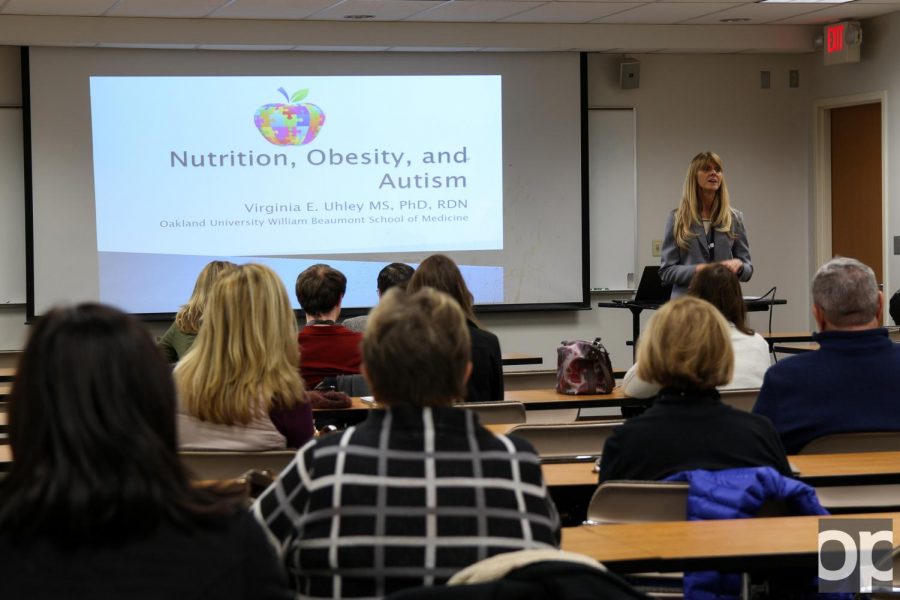OUCARES presentation focuses on obesity, nutrition and autism
As an expert in nutrition assessment methodology, measurement of clinical biomarkers associated with dietary intake and medical nutrition therapy for obesity, Dr. Virginia Uhley, Ph.D., RDN assistant professor of foundational medical studies at Oakland University William Beaumont School of Medicine, presented on obesity, nutrition and autism on Thursday, Oct. 18.
“Tonight we will be learning more about autism, obesity and how to mitigate obesity in special populations,” OUCARES Director Kristin Rohrbeck said. “This is part of our evening enrichment series. Every month we host a free presentation for the community to learn something specific that will hopefully be very helpful to the autism community.”
Uhley expressed that during her time in the clinic, she learned a great deal from her patients’ as it was firsthand experience.
“I have always learned more from my patients and their families than I’ve learned sitting in the classroom,” Uhley said. “I actually tell my medical students this all the time. What you think you know when you get into practice doesn’t actually match up. You have to start learning all over again.”
When she was in the clinic, she dealt directly with patients who experienced GI distress.
“Patients wouldn’t be sure what was causing the distress as there were all of these diets floating around, and there is a lot of different information about various vitamin deficiencies and minerals,” Uhley said. “It’s not very clear cut, and there are a lot of things that overlap.”
Children on the spectrum tend to be picky eaters, but Uhley wants to reinforce the fact that there are scientific reasons for their pickiness.
“The microbiome is a really fancy word for how you digest and absorb things,” she said. “It’s really talking about what bacteria are actually in your GI tract. There’s billions of them that are in your intestinal tract, and what you eat does change what is in your intestinal tract.”
Food selectivity, according to Uhley, has nothing to do with nutrient content, but how you feel when you eat a certain food. The taste buds in your mouth are like the GI tract, so what you taste in your mouth will send a signal. Someone on the spectrum can get a full-blown reaction simply by tasting a certain food.
“You can present a food to a child, and there can be a lot of emotion tied to that food,” Uhley said. “If someone gave it to them who they trusted and who they felt safe with, that becomes a safe food and something they will continue to eat.”
Children on the spectrum should be engaging in at least 60 minutes of physical activity each day as this engages muscle and bone strengthening.
“There is a higher prevalence of being overweight among adolescents with special healthcare needs including spina bifida, cerebral palsy, Prader-Willi, Down syndrome, muscular dystrophy, brain injury, visual impairments, learning disabilities, ADHD and autism spectrum disorders,” Uhley said. “Dietary intake, absence of physical education in school based special needs programs, lack of access to recreation facilities and medication all are factors for obesity prevalence.”
Throughout the coming months, OUCARES is hosting a variety of events for families who have loved ones on the spectrum and adults on the spectrum.
“We have a few really exciting events coming up through OUCARES,” Rohrbeck said. “We have a parent networking event coming up on Nov. 27, which is a time where families can come, have a really great meal and form lasting connections with people who are connected with adults on the spectrum. We have a holiday party for adults on the spectrum on Dec. 1, which always sells out.”






